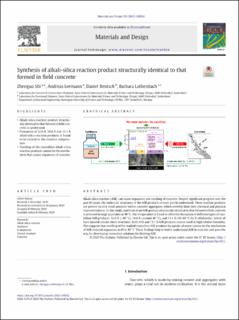Synthesis of alkali-silica reaction product structurally identical to that formed in field concrete
Peer reviewed, Journal article
Published version

Åpne
Permanent lenke
https://hdl.handle.net/11250/3015094Utgivelsesdato
2020Metadata
Vis full innførselSamlinger
Sammendrag
Alkali-silica reaction (ASR) can cause expansion and cracking of concrete. Despite significant progress over the past 80 years, the molecular structures of the ASR products remain poorly understood. These reaction products are present in very small amounts within concrete aggregates, which severely limit their chemical and physical characterizations. In this study, synthesis of an ASR product structurally identical to that formed in field concrete is achieved in large quantities at 40 °C. The temperature is found to affect the formation of different types of crystalline ASR products: 12.0 Å (<40 °C), 10.8 Å (around 40 °C), and 13.1 Å (60–80 °C for K-shlykovite), which all have layered silicate-sheet structures. Both 10.8 and 13.1 Å ASR products cannot swell at high relative humidity. This suggests that swelling of the studied crystalline ASR products by uptake of water cannot be the mechanism of ASR-induced expansion at 40 to 80 °C. These findings help to better understand ASR in concrete and pave the way for developing innovative solutions for limiting ASR.
